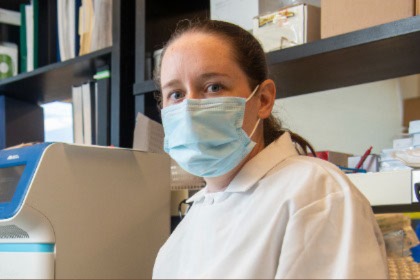(JANUARY 23, 2023) Virologist Emily Bruce, Ph.D., assistant professor of microbiology and molecular genetics, was quoted in an ArkansasIndian.com article about the increased transmissibility of the new Omicron variant.

Virologist Emily Bruce, Ph.D., assistant professor of microbiology and molecular genetics
(JANUARY 23, 2023) Virologist Emily Bruce, Ph.D., assistant professor of microbiology and molecular genetics, was quoted in an article in ArkansasIndian.com about two new studies that have shown immune evasion is the reason behind the new Omicron variant’s increased transmissibility.
The Omicron variant, first reported from South Africa and Botswana in late November, has now been detected in 171 countries so far. In many countries it has rapidly surged past other variants to become the dominant SARS-CoV-2 strain.
Omicron does not release large amounts of virus from infected people. The reason for its hyper-transmissibility stems from its ability to evade SARS-CoV-2 immunity caused by either vaccination or past infection, Bruce was quoted as saying.
In the first study by Harvard T. H. Chan School of Public Health in Boston, the researchers studied PCR-test results of nose and throat swabs collected from infected individuals and found that those who had Delta had a slightly higher peak viral load than did those with Omicron. Similarly, Harvard researchers also found that five days after an initial positive test for Omicron, about half of tested individuals had viral loads high enough that they were probably still infectious.
Such results are concerning, because guidelines published by the U.S. Centers for Disease Control and Prevention allow people infected with the virus to end their isolation five days after either testing positive or experiencing their first symptoms.
Read full story
at
ArkansasIndian.com